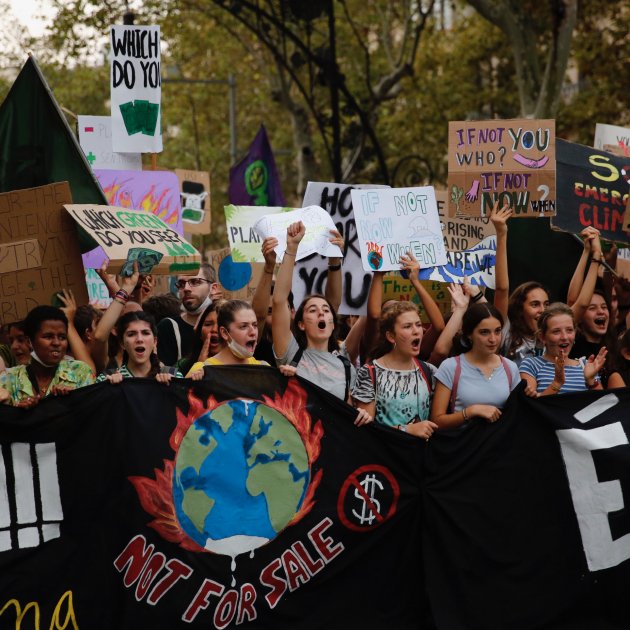The need to combat the climate crisis is a global consensus. This is what emerges from the largest ever climate change survey, presented this Thursday by the United Nations Development Programme (UNDP). The research, produced jointly by the University of Oxford, GeoPoll and the UK government, reveals that 80% of people around the world want their governments to take stronger action to tackle the climate crisis and 72% want a rapid energy transition to abandon the use of fossil fuels. In addition, a full 86% of respondents want countries to put aside geopolitical disputes and work together to tackle climate change - a demand that was made especially by countries in Africa (88%), Latin America (86%), followed by Europe (80%), Asia and Oceania (78%) and even in support from two-thirds of people in North America (66%). A consensus "especially surprising given the current global context of conflicts and rising nationalism", assesses the leadership of the UNDP in its report.
For the survey, more than 73,000 people from 77 different countries, speaking 87 different languages, were interviewed by telephone. The selected countries comprise 87% of the total world population. "The results are loud and clear: global citizens want their leaders to transcend their differences and act boldly to fight the climate crisis," said the head of the UNDP, Achim Steiner. Noting the "truly astonishing" level of consensus, Steiner urged world leaders to keep these results very much in mind when making new climate commitments following the Paris Agreement. "This is an issue on which almost all people, everywhere, can agree," he pointed out.
Consensus on decarbonisation among the major GHG emitters
The consensus is also broad enough in some of the countries that emit the most greenhouse gases, according to the survey, which sampled 20 of these polluting powerhouses. Demand for stronger actions is at 66% in the United States and Russia, 67% in Germany, 73% in China, 77% in South Africa and India, 85% in Brazil, to 88% in Iran and 93% in Italy. It should also be noted that among the countries who are the main producers of oil, coal and gas there is equally broad consensus to advance in decarbonisation, the energy transition to get beyond fossil fuels: 89% of Nigerians, 80% of the Chinese, 76% of Germans, 75% of Saudis, 69% of Australians and 54% of Americans. On the contrary, only 7% of those surveyed have ruled out that their country should achieve this transition.
Climate anxiety, on the rise
An interesting new feature of this United Nations macro-survey is the inclusion of a question about a phenomenon that has, of late, been much talked about: climate anxiety, that is, concern and proliferation of symptoms of psychological distress related to fear of the consequences of climate change and apocalyptic predictions. According to Oxford and UNDP research, 56% of respondents admit to thinking about the climate crisis between daily and weekly and 53% say they are more worried than they were last year. The majority of those becoming more concerned are people from the Least Developed Countries, and across the Small Island Developing States surveyed, 71% said they were more worried than last year.
In addition, 69% of people worldwide say that awareness of climate change influences their decisions such as where to live, where to work, what to buy or where to travel. Especially in the case of people from the Least Developed Countries, where 74% said it affected their decision making, but notably lower in Western Europe (52%) and North America (42%). In this regard, the University of Oxford sociology researcher, Stephen Fisher, highlights that the macro survey has made an effort to include "people from marginalized groups in the poorest parts of the world".
In short, in this second edition of the UNDP climate survey - the first was in 2021, and more limited -— more than seventy countries from all over the world have participated. The sample included more than 10% of respondents who had never been to school or from marginalized backgrounds in developing places. Countries included were Algeria, Argentina, Australia, Germany, Saudi Arabia, Barbados, Benin, Bangladesh, Bhutan, Brazil, Burkina Faso, Canada, Cambodia, Colombia, Ivory Coast, South Korea, Comoros, Egypt, Spain, United States, Ecuador, El Salvador, Ethiopia, France, Philippines, Greece, Guatemala, Ghana, Honduras, Japan, Kenya, Laos, Netherlands, Democratic Republic of Congo, Madagascar, Mozambique, Niger, Nigeria, Sweden, South Africa, Sudan, Sri Lanka, Samoa, Tanzania, Tunisia, Uganda, Zimbabwe, Dominican Republic, Haiti, Mexico, Nicaragua, Paraguay, Peru, United Kingdom, Iraq, Italy, Jordan, Morocco, China, Fiji, India, Indonesia, Myanmar, Nepal, Pakistan, Papua New Guinea, Solomon Islands and Vanuatu.
